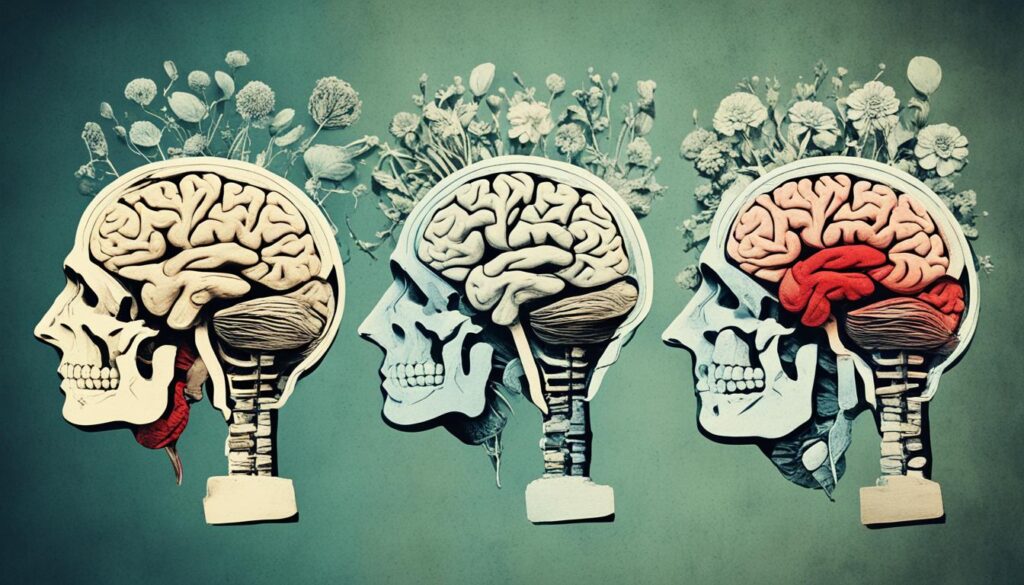As we age, our bodies and minds undergo various changes. One of the most concerning conditions associated with aging is Alzheimer’s disease, a progressive neurodegenerative disorder that affects memory, thinking, and behavior. Managing Alzheimer’s requires a comprehensive understanding of the disease and effective treatment strategies.
Alzheimer’s is a complex condition that affects millions of individuals worldwide. It not only impairs cognitive function but also has a significant impact on the overall quality of life. Therefore, finding ways to effectively treat Alzheimer’s is crucial for both the individuals affected and their loved ones.
In this article, we will explore the aging process, the significance of Alzheimer’s disease, and various treatment options available. Understanding these aspects is essential in developing strategies to manage and treat Alzheimer’s effectively.
Key Takeaways:
- Aging is a natural process that can contribute to cognitive decline, including the development of Alzheimer’s disease.
- Alzheimer’s disease significantly impacts brain health, memory loss, and overall cognitive function.
- Effective treatment options for Alzheimer’s include cognitive interventions, medication, and therapy approaches.
- Ongoing research and the development of strategies for aging and Alzheimer’s treatment are crucial.
Understanding the Aging Process
In this section, we will delve into the natural aging process and its impact on cognitive decline. As we age, the body undergoes various changes that can affect our physical and mental health. One of the key areas of concern is cognitive function, which can decline over time, leading to memory loss and other cognitive impairments.
During the natural aging process, the brain undergoes structural and functional changes. The number of neurons in the brain gradually decreases, and there may be a decline in the production of neurotransmitters, which are essential for communication between brain cells.
This gradual decline in brain function can contribute to cognitive decline, including difficulties with memory, attention, and problem-solving. It is important to note that while some level of cognitive decline is a normal part of the aging process, severe cognitive impairment, such as that seen in Alzheimer’s disease, is not a typical part of aging.
Factors That Influence Cognitive Decline:
- Genetics: Certain genetic factors can increase the risk of cognitive decline and the development of Alzheimer’s disease.
- Lifestyle Factors: Unhealthy lifestyle choices, such as a poor diet, lack of exercise, and smoking, can contribute to accelerated cognitive decline.
- Medical Conditions: Chronic conditions like diabetes, high blood pressure, and heart disease can increase the risk of cognitive decline.
- Environmental Factors: Exposure to toxins and pollutants in the environment can have a negative impact on brain health.
It is important to understand that while the aging process can contribute to cognitive decline, there are steps that individuals can take to promote healthy brain aging. Engaging in regular physical exercise, maintaining a balanced diet, staying mentally active through activities such as reading and puzzles, and managing stress can all help support cognitive health as we age.
“The aging process is a natural part of life, but it is essential to prioritize brain health and take proactive steps to maintain cognitive function. By adopting healthy lifestyle habits and staying mentally engaged, we can promote healthy aging and potentially reduce the risk of cognitive decline.”
Understanding Cognitive Decline in Alzheimer’s Disease
In Alzheimer’s disease, excessive cognitive decline occurs beyond what is considered normal aging. The disease is characterized by the presence of plaques and tangles in the brain, leading to the destruction of brain cells and the disruption of communication between them.
| Normal Aging | Alzheimer’s Disease |
|---|---|
| Gradual decline in cognitive function | Rapid and severe cognitive decline |
| Memory lapses occasionally | Frequent memory loss, including difficulties with recognizing familiar people and places |
| Ability to perform daily tasks independently | Difficulty with routine tasks, such as dressing and eating |
| No significant changes in personality or behavior | Changes in mood, personality, and behavior, including confusion and agitation |
As cognitive decline progresses in Alzheimer’s disease, it becomes increasingly challenging for individuals to perform daily tasks and maintain independence. Recognizing the signs of Alzheimer’s disease and seeking early medical intervention is crucial for managing the condition effectively.
The Significance of Alzheimer’s Disease
Alzheimer’s disease is a degenerative brain disorder that affects millions of people worldwide. It is the most common form of dementia, a term used to describe a group of symptoms that impact memory, thinking, and behavior. Alzheimer’s disease is characterized by progressive memory loss and cognitive decline, leading to difficulties in daily functioning.
The impact of Alzheimer’s disease goes beyond memory loss. It significantly affects brain health and overall cognitive function. As the disease progresses, individuals may experience difficulties with language, problem-solving, and decision-making. They may also exhibit changes in personality and behavior, becoming withdrawn or displaying mood swings.
Dementia, including Alzheimer’s disease, not only impacts the individuals diagnosed but also places a significant burden on their families and caregivers. Providing care for someone with Alzheimer’s disease can be emotionally challenging and physically demanding.
“Alzheimer’s disease is not a normal part of aging, but rather a debilitating condition that requires ongoing support and specialized care.”
Understanding the significance of Alzheimer’s disease is essential in promoting awareness, early detection, and effective management. By raising awareness, we can encourage research and support to find better treatments and, ultimately, a cure for this devastating disease.
Memory Loss and Cognitive Decline
One of the hallmark symptoms of Alzheimer’s disease is memory loss. Short-term memory is usually affected first, with individuals struggling to remember recent events or information. As the disease progresses, long-term memory may also be impaired, making it difficult to recall significant life events or recognize familiar faces.
In addition to memory loss, Alzheimer’s disease leads to cognitive decline, impacting various cognitive functions such as attention, problem-solving, and language skills. Everyday tasks become more challenging, and individuals may struggle to communicate effectively.
The Importance of Brain Health
Alzheimer’s disease underscores the importance of maintaining brain health throughout life. Engaging in activities that stimulate the mind, such as puzzles, reading, and social interactions, can help promote cognitive function and potentially reduce the risk of developing Alzheimer’s disease.

While there is currently no cure for Alzheimer’s disease, research continues to uncover new insights and potential treatment options. By prioritizing brain health and supporting ongoing research, we can work towards improving the lives of those affected by Alzheimer’s disease and finding a future free from this debilitating condition.
Treatment Options for Alzheimer’s
When it comes to Alzheimer’s disease, early diagnosis and proactive treatment are crucial for managing the condition effectively. While there is currently no cure for Alzheimer’s, there are various treatment options available that can help slow down the progression of the disease and improve the quality of life for individuals affected by it.
Cognitive Interventions
Cognitive interventions play a significant role in Alzheimer’s treatment. These interventions focus on stimulating cognitive function and enhancing memory, attention, and problem-solving skills. They include activities such as puzzles, brain games, and memory exercises, which can help individuals maintain their cognitive abilities for longer periods.
Medication
Medication can also be prescribed by healthcare professionals to manage Alzheimer’s disease. Common medications used for Alzheimer’s treatment include cholinesterase inhibitors and memantine. These medications help regulate neurotransmitters in the brain and can temporarily improve symptoms such as memory loss, confusion, and cognitive decline.
Therapy Approaches
Therapy approaches, such as occupational therapy, physical therapy, and speech therapy, can also be beneficial for individuals with Alzheimer’s. These therapies aim to enhance daily functioning, mobility, communication skills, and overall quality of life. They provide individuals with coping strategies and support to navigate the challenges associated with Alzheimer’s disease.
Incorporating a combination of cognitive interventions, medication, and therapy approaches can significantly improve the outcomes for individuals with Alzheimer’s disease. It is essential for healthcare professionals to work closely with patients and their families to develop personalized treatment plans that address their unique needs and goals.
While treatment options can help manage Alzheimer’s symptoms, it is important to note that each individual’s response to treatment may vary. Additionally, ongoing research and development in the field of Alzheimer’s treatment continue to explore new approaches and strategies for better managing the disease.

Conclusion
In conclusion, understanding the aging process and its implications for Alzheimer’s disease is crucial in devising effective treatment strategies. As we age, cognitive decline becomes more prevalent, making it essential to prioritize brain health and explore ways to manage this debilitating condition.
Throughout this article, we have highlighted the significance of Alzheimer’s disease, its impact on memory loss and overall cognitive function. We have also explored various treatment options, including cognitive interventions, medication, and therapy approaches that can help manage the symptoms of Alzheimer’s and improve the quality of life for those affected.
However, it’s important to remember that research is constantly evolving, and the quest for better aging and Alzheimer’s treatments continues. Ongoing research and the development of innovative strategies are essential not only to provide relief to individuals suffering from this condition but also to potentially find a cure in the future.
By staying informed and committed to advancing research in aging and Alzheimer’s, we can collectively contribute to improved treatment outcomes and a brighter future for those affected by this devastating disease.
